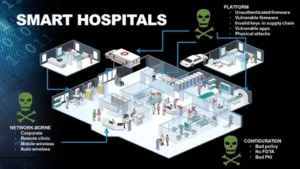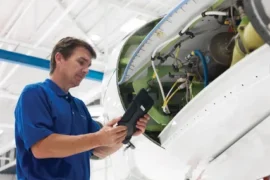Introduction
In the rapidly evolving landscape of healthcare, the integration of cutting-edge technology has brought about transformative changes in patient care and medical interoperability within smart hospitals. These advancements are reshaping how healthcare services are delivered, ensuring better outcomes, enhanced efficiency, and a more patient-centric approach.
The advent of smart hospitals has marked a significant milestone in the healthcare sector. These advanced facilities leverage state-of-the-art technology to optimize patient care, streamline operations, and enhance medical interoperability. From electronic health records (EHRs) to telemedicine, and from AI-driven diagnostics to the Internet of Medical Things (IoMT), smart hospitals are equipped with a plethora of technologies designed to provide superior healthcare services. In this post, we will explore how these technological advancements are enhancing patient care and medical interoperability, and what the future holds for smart hospitals.

Technological Innovations in Patient Care
1. Electronic Health Records (EHRs)
Electronic Health Records (EHRs) have revolutionized patient care by providing a comprehensive and accessible digital record of a patient’s medical history. These records include information about diagnoses, treatments, medications, and lab results, which can be easily shared among healthcare providers. This seamless sharing of information enhances medical interoperability, allowing for more coordinated and efficient care.
EHRs reduce the risk of errors, as healthcare providers have immediate access to accurate and up-to-date patient information. This accessibility is particularly crucial in emergency situations where quick decision-making is essential. Furthermore, EHRs facilitate better patient engagement, as patients can access their own records, schedule appointments, and communicate with their healthcare providers through patient portals.
2. Telemedicine
Telemedicine has emerged as a game-changer in the realm of patient care, especially in the wake of the COVID-19 pandemic. It allows patients to consult with healthcare providers remotely, using video conferencing and other digital communication tools. This technological advancement has made healthcare more accessible, particularly for individuals in remote or underserved areas.
Telemedicine not only enhances patient care by providing timely consultations but also ensures medical interoperability by integrating with EHR systems. This integration allows healthcare providers to access patient records during virtual visits, ensuring continuity of care. Additionally, telemedicine reduces the need for physical visits, thereby minimizing the risk of exposure to infectious diseases and reducing the burden on healthcare facilities.
3. AI-Driven Diagnostics
Artificial Intelligence (AI) is transforming patient care by enabling more accurate and efficient diagnostics. AI algorithms can analyze vast amounts of medical data, including medical images, lab results, and patient records, to identify patterns and make predictions. These capabilities enhance diagnostic accuracy, reduce the likelihood of human error, and expedite the diagnostic process.
In smart hospitals, AI-driven diagnostics are integrated with other technological systems, such as EHRs and IoMT devices, to provide comprehensive and real-time insights. This integration enhances medical interoperability by ensuring that diagnostic information is readily available to all relevant healthcare providers. Consequently, AI-driven diagnostics contribute to more personalized and effective treatment plans, improving patient outcomes.
Enhancing Medical Interoperability in Smart Hospitals
1. The Internet of Medical Things (IoMT)
The Internet of Medical Things (IoMT) refers to the network of connected medical devices that collect, transmit, and analyze patient data. These devices include wearable health monitors, smart implants, and remote patient monitoring systems. IoMT plays a crucial role in enhancing medical interoperability by ensuring seamless data exchange between devices and healthcare systems.
In smart hospitals, IoMT devices continuously monitor patients’ vital signs and other health metrics, transmitting this data to EHR systems and healthcare providers in real time. This constant flow of information allows for proactive and preventive care, as healthcare providers can detect potential issues early and intervene promptly. Moreover, IoMT enhances patient care by enabling remote monitoring, reducing the need for frequent hospital visits and allowing patients to receive care in the comfort of their homes.
2. Interoperable Health Information Exchanges (HIEs)
Health Information Exchanges (HIEs) are platforms that facilitate the secure sharing of patient information among different healthcare organizations. These exchanges play a critical role in enhancing medical interoperability by ensuring that patient data is accessible to all authorized healthcare providers, regardless of where the patient receives care.
In smart hospitals, HIEs enable a more coordinated and comprehensive approach to patient care. By providing a centralized repository of patient information, HIEs allow healthcare providers to access a complete picture of a patient’s medical history, ensuring more informed decision-making. This level of interoperability reduces the risk of redundant tests and treatments, ultimately leading to more efficient and cost-effective care.
3. Blockchain Technology
Blockchain technology is emerging as a powerful tool for enhancing medical interoperability and ensuring the security and integrity of patient data. Blockchain’s decentralized and immutable nature makes it ideal for managing health records, as it allows for secure and transparent data sharing while preventing unauthorized access and tampering.
In smart hospitals, blockchain can be used to create a secure and interoperable health information network. This network ensures that patient data is accurately recorded and easily accessible to authorized healthcare providers. By enhancing data security and interoperability, blockchain technology contributes to better patient care and more efficient healthcare operations.
Overcoming Challenges in Implementing Technological Solutions
1. Data Privacy and Security
One of the primary challenges in implementing technological solutions in smart hospitals is ensuring data privacy and security. The sensitive nature of health information makes it a prime target for cyberattacks, and any breach can have severe consequences for both patients and healthcare providers.
To address this challenge, smart hospitals must implement robust cybersecurity measures, including encryption, multi-factor authentication, and regular security audits. Additionally, compliance with regulations such as the Health Insurance Portability and Accountability Act (HIPAA) is essential to protect patient data and maintain trust in the healthcare system.
2. Integration and Interoperability
While technological advancements have the potential to revolutionize patient care, their effectiveness is often hindered by a lack of integration and interoperability between different systems. Ensuring seamless data exchange between EHRs, IoMT devices, and other healthcare technologies is crucial for realizing the full benefits of these innovations.
To overcome this challenge, smart hospitals must adopt standardized protocols and frameworks that facilitate interoperability. Initiatives such as the Fast Healthcare Interoperability Resources (FHIR) standard are designed to promote data exchange and integration, enabling healthcare providers to access and share patient information more effectively.
3. Cost and Resource Constraints
Implementing advanced technological solutions in smart hospitals requires significant financial investment and resources. Many healthcare organizations, particularly those in resource-constrained settings, may find it challenging to allocate the necessary funds for these initiatives.
To address this challenge, smart hospitals can explore alternative funding options, such as public-private partnerships and grants. Additionally, adopting a phased implementation approach can help distribute costs over time, making it more manageable for healthcare organizations to invest in technological advancements.
The Future of Smart Hospitals: Trends and Innovations
1. Personalized Medicine
Personalized medicine is an emerging trend that leverages genetic information and other patient-specific data to tailor treatments to individual patients. By integrating personalized medicine with advanced technologies such as AI and IoMT, smart hospitals can provide more precise and effective care.
For instance, AI algorithms can analyze a patient’s genetic data to predict their response to different medications, allowing healthcare providers to choose the most suitable treatment. Similarly, IoMT devices can monitor a patient’s response to treatment in real time, enabling continuous adjustments to optimize outcomes.
2. Robotics and Automation
Robotics and automation are set to play a significant role in the future of smart hospitals. Robotic surgery systems, for example, enable minimally invasive procedures with greater precision and reduced recovery times. Automation can also streamline administrative tasks, such as scheduling and billing, freeing up healthcare providers to focus on patient care.
In addition to enhancing patient care, robotics and automation contribute to medical interoperability by integrating with other technological systems. For example, robotic surgery systems can automatically update EHRs with procedural data, ensuring that all relevant information is available to healthcare providers.
3. Artificial Intelligence and Machine Learning
The integration of AI and machine learning in smart hospitals is expected to continue advancing, with new applications emerging in diagnostics, treatment planning, and patient monitoring. AI-powered tools can analyze vast amounts of data to identify patterns and make predictions, supporting healthcare providers in making informed decisions.
Machine learning algorithms can also continuously improve over time, learning from new data to enhance their accuracy and effectiveness. This ongoing improvement will further enhance patient care and medical interoperability, as AI-powered tools become increasingly integrated into healthcare systems.
Conclusion
The technological transformation in smart hospitals is revolutionizing patient care and enhancing medical interoperability, setting new standards in the healthcare industry. From EHRs and telemedicine to AI-driven diagnostics and IoMT, these innovations are improving patient outcomes, increasing efficiency, and ensuring a more patient-centric approach to healthcare. As we look to the future, trends such as personalized medicine, robotics, and AI will continue to drive advancements in smart hospitals, paving the way for a more connected and efficient healthcare system.
We invite you to share your thoughts and experiences with technological advancements in healthcare. How have these innovations impacted your experience as a patient or healthcare provider? Leave a comment below and join the conversation!





